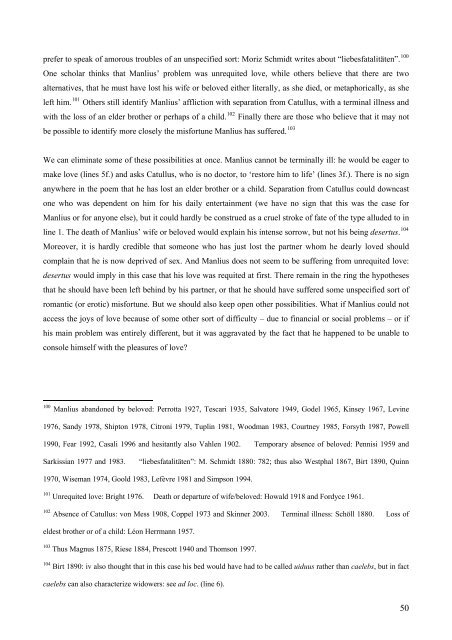CATULLUS 68 - Scuola Normale Superiore
CATULLUS 68 - Scuola Normale Superiore
CATULLUS 68 - Scuola Normale Superiore
Create successful ePaper yourself
Turn your PDF publications into a flip-book with our unique Google optimized e-Paper software.
prefer to speak of amorous troubles of an unspecified sort: Moriz Schmidt writes about “liebesfatalitäten”. 100<br />
One scholar thinks that Manlius’ problem was unrequited love, while others believe that there are two<br />
alternatives, that he must have lost his wife or beloved either literally, as she died, or metaphorically, as she<br />
left him. 101 Others still identify Manlius’ affliction with separation from Catullus, with a terminal illness and<br />
with the loss of an elder brother or perhaps of a child. 102 Finally there are those who believe that it may not<br />
be possible to identify more closely the misfortune Manlius has suffered. 103<br />
We can eliminate some of these possibilities at once. Manlius cannot be terminally ill: he would be eager to<br />
make love (lines 5f.) and asks Catullus, who is no doctor, to ‘restore him to life’ (lines 3f.). There is no sign<br />
anywhere in the poem that he has lost an elder brother or a child. Separation from Catullus could downcast<br />
one who was dependent on him for his daily entertainment (we have no sign that this was the case for<br />
Manlius or for anyone else), but it could hardly be construed as a cruel stroke of fate of the type alluded to in<br />
line 1. The death of Manlius’ wife or beloved would explain his intense sorrow, but not his being desertus. 104<br />
Moreover, it is hardly credible that someone who has just lost the partner whom he dearly loved should<br />
complain that he is now deprived of sex. And Manlius does not seem to be suffering from unrequited love:<br />
desertus would imply in this case that his love was requited at first. There remain in the ring the hypotheses<br />
that he should have been left behind by his partner, or that he should have suffered some unspecified sort of<br />
romantic (or erotic) misfortune. But we should also keep open other possibilities. What if Manlius could not<br />
access the joys of love because of some other sort of difficulty – due to financial or social problems – or if<br />
his main problem was entirely different, but it was aggravated by the fact that he happened to be unable to<br />
console himself with the pleasures of love?<br />
100 Manlius abandoned by beloved: Perrotta 1927, Tescari 1935, Salvatore 1949, Godel 1965, Kinsey 1967, Levine<br />
1976, Sandy 1978, Shipton 1978, Citroni 1979, Tuplin 1981, Woodman 1983, Courtney 1985, Forsyth 1987, Powell<br />
1990, Fear 1992, Casali 1996 and hesitantly also Vahlen 1902. Temporary absence of beloved: Pennisi 1959 and<br />
Sarkissian 1977 and 1983. “liebesfatalitäten”: M. Schmidt 1880: 782; thus also Westphal 1867, Birt 1890, Quinn<br />
1970, Wiseman 1974, Goold 1983, Lefèvre 1981 and Simpson 1994.<br />
101 Unrequited love: Bright 1976. Death or departure of wife/beloved: Howald 1918 and Fordyce 1961.<br />
102 Absence of Catullus: von Mess 1908, Coppel 1973 and Skinner 2003. Terminal illness: Schöll 1880. Loss of<br />
eldest brother or of a child: Léon Herrmann 1957.<br />
103 Thus Magnus 1875, Riese 1884, Prescott 1940 and Thomson 1997.<br />
104 Birt 1890: iv also thought that in this case his bed would have had to be called uiduus rather than caelebs, but in fact<br />
caelebs can also characterize widowers: see ad loc. (line 6).<br />
50






